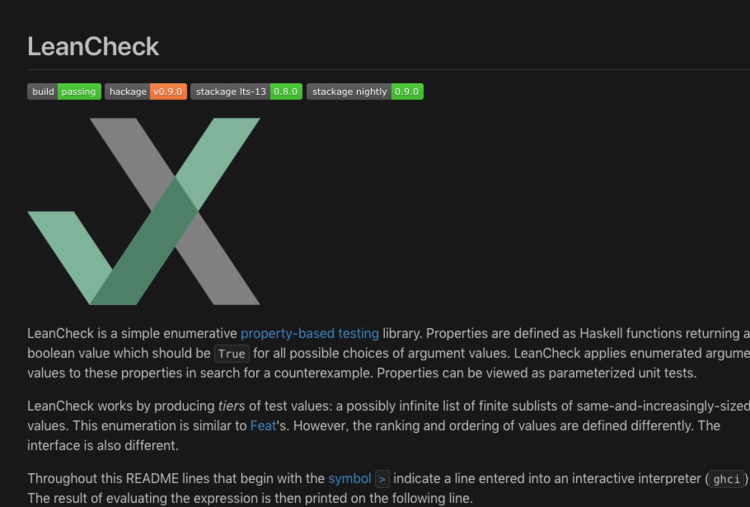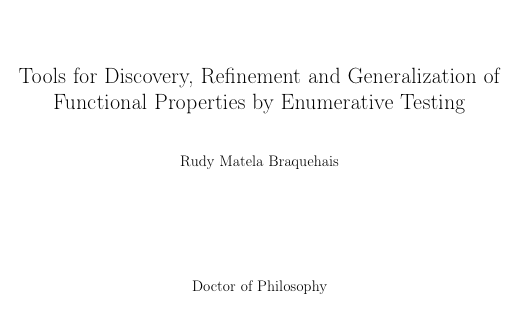LeanProps の紹介
TSUYUSATO Kitsune (@MakeNowJust)
前回のあらすじ
ある日のこと
ひと目で、尋常じゃないライブラリと見抜いたよ
(Haskell のライブラリなので)
Scala に移植してみよう!
本編
自己紹介
- TSUYUSATO Kitsune (@MakeNowJust)
- 普段は TypeScript とかを書いている
- Crystal というプログラミング言語のコントリビュータ
- 形式言語が好き
まず初めに、
LeanCheck とは?
- Haskell のライブラリ
- "simple enumerative property-based testing library"
- 実装が比較的小さい
(Test.LeanCheck.Coreはコメントを除いて 185 行くらい)
> holds 100 $ \xs-> sort (sort xs) == sort (xs :: [Int])
True
LeanCheck とは?
- SmallCheck のような感じで、小さいものから順番にチェックしていく方針
- ランダムにデータを生成するのはサポートしていない
- Generic を使ったデータを生成するクラスの自動導出
- Template Haskell を使ったデータを生成する型クラスの自動導出
- 関数の生成をサポートしている
- 関数に対する
Showクラスのインスタンスを提供している
(個人的には下の二つが面白いと思った)
早速、Scala に移植してみた
LeanProps という名前になった
(leancheck4s という名前が
当時はなぜか思い付かなかった‥‥)
LeanProps で出来ること
Intなどの整数、Doubleなどの浮動小数点数、
いくつかのコレクション、関数などの生成- ↑ の型の値を文字列にしてて表示する機能(pretty print)
- property-based testing の基本的なサポート
- Magnolia による生成と表示を担当する型クラスの自動導出
scala> import codes.quine.leanprops._
import codes.quine.leanprops._
scala> inspect { (x: Boolean, y: Boolean) => x && y }
res0: String =
((x, y) => (x, y) match {
case (true, true) => true
case _ => false
})
scala> holds(100) { (xs: List[Int]) =>
| xs.sorted.sorted == xs.sorted
| }
res1: Boolean = true
動いています
LeanProps の主要な型
trait Listable[A]:Aが自動生成可能なことを表す型クラスtrait Inspectable[A]:Aが文字列にして表示可能なことを表す型クラスclass Tiers[A]:Stream[Seq[A]]をラップしたデータ構造class WithInspectConfig[A]:InspectConfigを持った Reader Monad
一番重要なのはtrait Listable[A]。
trait Listable[A]
trait Listable[A] {
def tiers: Tiers[A]
}
Tiers[A]はStream[Seq[A]]のラッパ- なぜ単純な
Stream[A]ではなくStream[Seq[A]]なのは
データを組み合わせられるようにするため
どうしてStream[A]じゃダメ?
仮にListable[A]がこうだったとする。
trait Listable[A] {
def list: Stream[A]
}
list[A] = Listable[A].listとする。
どうしてStream[A]じゃダメ?
list[Int] = Stream(0, 1, -1, ...)そこで
list[(A, B)]を考えると、単純な実装だと‥list[(A, B)] = for { x <- list[A] y <- list[B] } yield (x, y)
どうしてStream[A]じゃダメ?
つまり、
Stream((list[A](0), list[B](0)), (list[A](0), list[B](1)), ... (list[B]が終了するまで続く), (list[A](1), list[B](0)), ...)(Int, Int)の場合、
左側に0しか出てこなくなる。
どうしてStream[A]じゃダメ?
そこで
tiers[A]: Stream[Seq[A]]を考える。tiers[Int] = Stream(Seq(0), Seq(1), Seq(-1), ...)tiers[(A, B)]は次のような感じ、def prod[A, B](xs: Seq[A], ys: Seq[B]) = for (x <- xs; y <- ys) yield (x, y) Stream(prod(tiers[A](0), tiers[B](0)), // 添字の合計が0 prod(tiers[A](0), tiers[B](1)) ++ prod(tiers[A](1), tiers[B](0)), // 添字の合計が1 prod(tiers[A](0), tiers[B](2)) ++ prod(tiers[A](1), tiers[B](1)) ++ prod(tiers[A](2), tiers[B](0)), // 添字の合計が2 ...)こうすると、無限リストでもいい感じに積を取れる。
trait Listable[A]
SetやMapの場合は重複しないように生成したり、
いくつか工夫する必要がある。Function1の場合はMapとほとんど同じなのだけど、
生成される関数を全域にするためフォールバック用の値も
同時に生成する。- 詳しくはソースコードを読んでください。
関数の表示
(さすがに時間が無さそうなので三行で)
- 引数の組を生成して、関数を呼び出して、返り値を記録
- 返り値の同じ引数の組を
_で上手い具合に置き換えていく
(実際はそんなに上手くやっていない) - それらを並べて表示する。
引数を自動生成できるんだから、
たくさん呼び出して返り値を記録すれば
それっぽいmatch式が作れるよね、というノリ。
trait Inspectable[A]
trait Inspectable[A] {
def inspect(x: A): WithInspectConfig[A]
def bindtiers(x: Try[A]): Tiers[(Seq[Seq[String]], Try[String])]
}
このbindtiersが、引数と返り値を記録するメソッド。
現実は厳しい‥‥
scala> inspect { (xs: List[Int]) => xs.head }
res3: String =
(x => x match {
case List() => throw new NoSuchElementException("head of empty list")
case List(0) => 0
case List(0, 0) => 0
case List(1) => 1
case List(0, 0, 0) => 0
case List(0, 1) => 0
case List(1, 0) => 1
case List(-1) => -1
...
})
ぶっちゃけBooleanのときくらいしか上手くいかない。
思ったことなど
Streamは難しすぎる。
すぐに OOM と StackOverflow を起こす- Magnolia の黒魔術感‥‥。
- テストは μTest と sbt-doctest で書いた。
doctest 良い - ドキュメントは mdoc と Docusaurus で作った。
大したライブラリじゃないのに無駄に立派になってしまう
今後の目標、やっていき
- いくつかの名前のリファクタリング。
WithInspectConfigって名前どうなの? Listable、Inspectableのインスタンスを増やすcats・scalazの型のインスタンスを実装するshapelessでの自動導出sbtとの統合disciplineのようなインターフェース(?)


